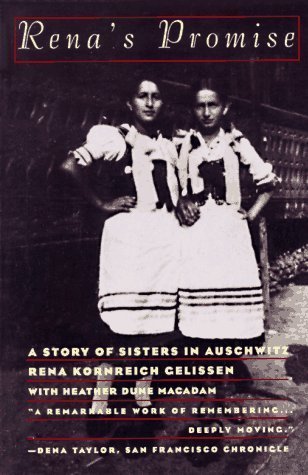
Rena's Promise: Two Sisters in Auschwitz
Book Description
In a relentless fight for survival, two sisters find their bond pushed to the limits within the horrors of Auschwitz. Rena Kornreich Gelissen’s heart-wrenching account reveals a tale of unimaginable strength, resilience, and the unbreakable ties of family amidst despair. As starvation, brutality, and loss loom large, Rena clings to one promise: to protect her beloved sister at all costs. Each decision could mean life or death, forging a path filled with harrowing choices and moments of courage that will forever change their fates. Can love truly conquer the darkest of circumstances?
Quick Book Summary
"Rena's Promise: Two Sisters in Auschwitz" is a poignant memoir that chronicles Rena Kornreich Gelissen’s harrowing experiences as one of the first Jews transported to Auschwitz. Guided by the unbreakable promise to her younger sister Danka, Rena becomes both a protector and a source of hope as they navigate the daily atrocities and uncertainties of the Nazi concentration camp. Facing starvation, forced labor, violence, and the constant threat of death, the sisters rely on their resilience and the deep bond of family to endure. The book weaves together their journey of survival, the power of love and sacrifice, and moments of kindness amid inhumanity, revealing the immense strength required to persist against overwhelming odds.
Summary of Key Ideas
Table of Contents
Unbreakable Family Bonds
Rena Kornreich Gelissen’s journey begins in her peaceful, close-knit Polish town, abruptly transformed by Nazi occupation and the onset of World War II. The threat intensifies as Jews are rounded up. When Rena hears her younger sister Danka may be left behind, she makes a solemn promise to her mother to watch over Danka no matter what comes. This oath becomes the central pillar of Rena’s resolve, guiding every choice she makes when both sisters board the first transport to Auschwitz, stepping into a world defined by cruelty and survival.
Survival Amid Unthinkable Hardship
Inside Auschwitz, daily life is dominated by starvation, forced labor, violence, and relentless psychological torment. Rena and Danka endure endless roll calls, grueling physical tasks, and degrading treatment. Each day brings new threats: selections for the gas chambers, the terror of losing one another, the fear that any misstep could cost their lives. Nevertheless, their sisterly bond strengthens, serving as a lifeline in an environment designed to break spirits. Rena’s resolve to fulfill her promise drive acts of protection—dividing meager rations, offering comfort, and sometimes deceiving guards to keep Danka safe.
Moral Choices and Sacrifice
Survival is not just a matter of luck but requires constant moral choices. The sisters often face situations where their own survival may hinge on turning away from others’ suffering, but they cling to compassion. The girls form a small circle with other prisoners, sharing support and small mercies. Sacrifice becomes a recurring theme; Rena selflessly takes on more difficult tasks or risks punishment to shield Danka and others. This moral clarity, even when it forces wrenching decisions, distinguishes them and illuminates the memoir’s ethical core.
The Endurance of Hope
Despite the overwhelming brutality, hope endures. The sisters find strength in small moments: a song, a kind word, or a memory of home. Faith in each other and a determination to survive become acts of quiet rebellion against Nazi dehumanization. Even as fellow inmates disappear, and death looms as a daily threat, Rena and Danka nurture the belief that liberation is possible, refusing to relinquish hope. Their commitment to life and each other sustains them during the darkest times.
Moments of Humanity in Darkness
Rena’s account does not shy away from the horrors of Auschwitz, but it also highlights fleeting instances of humanity. Some guards show rare kindnesses; inmates briefly unite to help each other; and, sometimes, moments of laughter pierce the gloom. After months of suffering, the sisters are finally liberated, but the scars—physical and emotional—remain. Rena’s story concludes with a lasting message: love, loyalty, and resilience can triumph even in humanity’s bleakest hours, transforming tragedy into a testament of enduring strength.
Download This Summary
Get a free PDF of this summary instantly — no email required.





